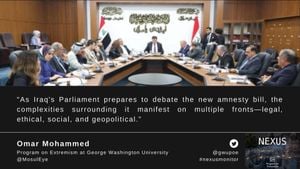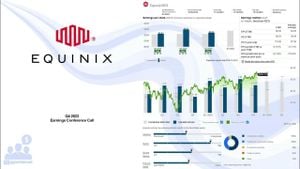The beginning of Ramadan, marked by the sighting of the moon, is set to commence on March 1, 2025, as confirmed by the Grande Mosquée de Paris. This date follows the 'Nuit du Doute' on February 28, where religious authorities will observe the new moon to finalize the start of this important month of fasting for millions of Muslims.
Ramadan, the ninth month of the Islamic calendar, holds substantial significance as it involves fasting from dawn until sunset, aimed at fostering spirituality and self-discipline among practitioners. During this period, observers refrain from eating and drinking, as well as from smoking and engaging in negative behaviors like lying or violence.
According to the Conseil Français du Culte Musulman (CFCM), astronomical calculations indicate it is highly likely the new moon will be sighted on February 28, establishing March 1 as the first day of Ramadan. This year, Ramadan is anticipated to run until March 30 or March 31, with Iftar meals breaking the fast each evening after sunset.
To adhere to fasting regulations, the daily schedule will revolve significantly around prayer times, which change according to the sun's position. Muslims are expected to perform five daily prayers, including the early morning Fajr prayer before dawn, which marks the commencement of their fast.
Fasting also necessitates evening meals known as Iftar, where believers often break their fast with dates and water before enjoying larger meal portions. The hours for Suhur (the pre-dawn meal) and Iftar will vary during the month, affected by geographical location, since sunrise and sunset times differ across France.
The flexible nature of the Islamic calendar, which is lunar-based, causes Ramadan to shift approximately ten days earlier each year relative to the Gregorian calendar. This year’s Ramadan will begin earlier than the previous year; for example, Ramadan 2024 commenced on March 10. Consequently, 2030 will see two distinguished months of Ramadan due to its shortening compared to the solar calendar.
While female observers who are menstruated or individuals who are ill, pregnant, elderly, or traveling are exempt from fasting, they are encouraged to maintain their prayers and reflect on their faith. This seems especially poignant during Ramadan, which is considered one of the five pillars of Islam, and focuses heavily on prayer, charity, and community bonding.
Fasting and prayer are interlinked during this month, as each prayer is scheduled around some aspect of the fasting regimen. For 2025, the prayer timings are: Fajr at approximately 6:06 AM, Dhuhr at 1:03 PM, and the sunset prayer Maghrib at around 6:37 PM on the start date. Each day, these timings will adjust slightly until the end of Ramadan.
It is not merely about abstaining from food; this month is about reflection, gratitude, and charity. Many people take the opportunity to support charitable causes, reinforcing the community spirit and emphasizing values of empathy and help. Eid al-Fitr, the feast marking the end of Ramadan, is another occasion for communal gatherings.
The anticipation surrounding Ramadan 2025 unifies Muslims across various regions, as they prepare to join together for evenings of prayer and shared meals during this sacred month, welcoming the challenges and blessings the month brings.
Overall, Ramadan serves as both a religious observance and cultural experience, promoting self-examination and mindfulness among its followers. It reflects the dynamism of Islamic culture and its significant impact on the lives of millions around the globe.



